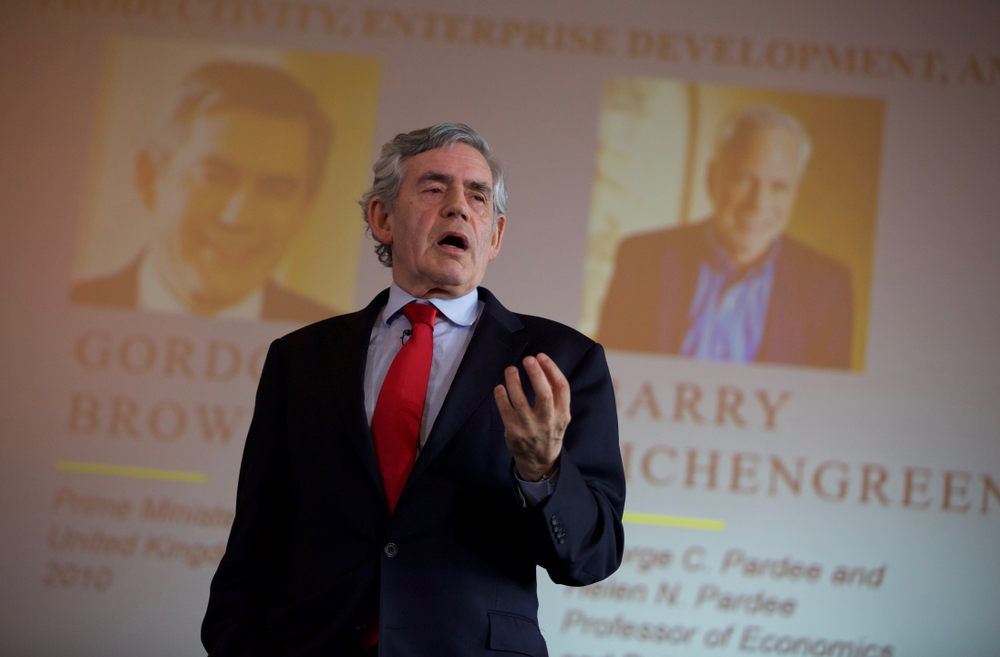The British government insists that regardless of the dislocation caused by the Covid-19 crisis it is still pressing on with the Brexit process to separate Britain from the rest of the world’s economy.
However former Labour Prime Minister Gordon Brown has shown an alternative approach is possible, and joined in a 205-strong international group – including more than 100 other former Presidents and Prime Ministers and current economic and health leaders in the developed and developing world – in an appeal for a multi-billion dollar coronavirus fighting fund.
Their open letter to G20 leaders calls for the creation of a G20 executive task force and an immediate global pledging conference to approve and co-ordinate.
It urges global collaboration and commitment to funding “far beyond the current capacity of our existing international institutions” to speed up the search for a vaccine, cure and treatments and revive the global economy.
“The economic emergency will not be resolved until the health emergency is addressed: the health emergency will not end simply by conquering the disease in one country alone but by ensuring recovery from COVID-19 in all countries,” the statement says.
The plea, issued on April 7 calls for agreement ‘within days’ for:
- $8 billion to rapidly hasten the global effort for vaccines, cure and treatment.
- $35 billion to support health systems, from ventilators to test kits and protective equipment for health workers.
- And $150 billion for developing countries to fight the medical and economic crisis, and prevent a second wave of the disease flowing back into countries as they come out of the first wave.
“This means waiving debt interest payments for the poorest countries, including $44 billion due this year from Africa. A $500-$600 billion issue of additional resources by the IMF in the form of special drawing rights is proposed.”
The letter also urges the co-ordination of fiscal stimuli to avoid a recession becoming a depression.
The group states: “All health systems – even the most sophisticated and best funded – are buckling under the pressures of the virus. Yet if we do nothing as the disease spreads in poorer African, Asian and Latin American cities which have little testing equipment, hardly any ventilators, and few medical supplies; and where social distancing and even washing hands are difficult to achieve, COVD-19 will persist there – and re-emerge to hit the rest of the world with further rounds that will prolong the crisis.
“World leaders must immediately agree to commit $8 billion – as set out by the Global Preparedness Monitoring Board – to fill the most urgent gaps in the COVID-19 response. This includes $1 billion this year for WHO, $3 billion for vaccines and $2.25 billion for therapeutics.
“Instead of each country, or state or province within it, competing for a share of the existing capacity, with the risk of rapidly-increasing prices, we should also be vastly increasing capacity by supporting the WHO in coordinating the global production and procurement of medical supplies, such as testing kits, personal protection equipment, and ITU technology to meet fully the worldwide demand. We will also need to stockpile and distribute essential equipment.
“$35 billion will be required, as highlighted by WHO, to support countries with weaker health systems and especially vulnerable populations, including the provision of vital medical supplies, surge support to the national health workforce (70% of whom in many countries are underpaid women) and strengthening national resilience and preparedness.
“According to WHO, almost 30% of countries have no COVID-19 national preparedness response plans and only half have a national infection prevention and control program. Health systems in lower income countries will struggle to cope; even the most optimistic estimates from Imperial College London suggest there will be 900,000 deaths in Asia and 300,000 in Africa.
“We propose convening a global pledging conference – its purpose supported by a G20 Executive Task Force – to commit resources to meeting these emergency global health needs.”
On the Global Economic outlook, the group propose a range of measures and state:
… “The long term solution is a radical rethink of global public health and a refashioning – together with proper resourcing – of the entwined global health and financial architecture. The UN, the G20 and interested partners should work together to co-ordinate further action.”
Dear Reader,
If you like our content please support our campaigning journalism to protect health care for all.
Our goal is to inform people, hold our politicians to account and help to build change through evidence based ideas.
Everyone should have access to comprehensive healthcare, but our NHS needs support. You can help us to continue to counter bad policy, battle neglect of the NHS and correct dangerous mis-infomation.
Supporters of the NHS are crucial in sustaining our health service and with your help we will be able to engage more people in securing its future.
Please donate to help support our campaigning NHS research and journalism.


